Whose History Gets Remembered? Unearthing the Past to Shape the Archive of Now. Collecting Queensland's Refugee history.
By Dr Zhila Gholami, 2025 John Oxley Library Fellow | 9 June 2025
This blog was written by 2025 John Oxley Library Fellow, Dr Zhila Gholami as part of her fellowship project, Voices of Diversity: Collecting and Preserving the Refugee Experience in Queensland.
The history of Queensland—and of Australia more broadly—is deeply entwined with two foundational and enduring narratives: the story of settlers, who arrived by choice in search of opportunity, land, or power, and the story of Aboriginal and Torres Strait Islander peoples, who have endured centuries of violence, dispossession, and systemic injustice. These dual narratives of colonisation and survival are not relics of the past—they are living legacies that continue to shape the nation’s laws, institutions, cultural memory, and collective identity. They determine who is seen as belonging, who is commemorated, and who is rendered invisible.
Beneath and beyond these dominant narratives lies another fragile yet powerful thread: the stories of those who arrived not by choice but by necessity—refugees, displaced peoples, and stateless communities. Too often overlooked, misrepresented, or silenced, these stories speak of survival, resilience, and the persistent struggle to find belonging in a land shaped by both welcome and exclusion. These voices complicate the frameworks of belonging that are tightly bound to settler identity and colonial logics. They reveal the contradictions at the heart of national narratives—where ideals of fairness, multiculturalism, and opportunity exist uneasily alongside exclusionary policies and racialized hierarchies. Acknowledging and valuing these histories is not merely a gesture of inclusion; it is a necessary act of reckoning that confronts the unfinished business of justice, sovereignty, and reconciliation in Australia. Without this recognition, any understanding of Queensland’s past and present—and Australia’s broader history—remains incomplete, and cycles of erasure will continue to impact present and future generations.
My research project, Voices of Diversity: Collecting and Preserving the Refugee Experience in Queensland, arises from this urgent need to engage with marginalised histories and perspectives. It does not claim to be exhaustive, but it marks the beginning of what I hope will become a long-term and evolving body of work. During this fellowship period, the project focuses on identifying, documenting, and amplifying the lived experiences of refugees, displaced peoples, and stateless individuals who have made Queensland their home. It also seeks to reframe refugee narratives as foundational—not peripheral—to the cultural and historical fabric of Queensland today. By centring these voices, the project challenges dominant historical accounts and opens up space for a more inclusive, complex, and honest understanding of the region’s past and present. This work is not only about preservation; it is an act of resistance against erasure, and a call for recognition, justice, and belonging.
State Library of Queensland is uniquely positioned to support this vital work, given its deep and ongoing commitment to preserving diverse histories and fostering community engagement. As a trusted custodian of the state’s cultural memory, the Library provides invaluable archival expertise, expansive resources, and broad public access—ensuring that refugee narratives are not only preserved but also made visible and accessible to a wide audience. Its role as a dynamic centre for education, research, and public dialogue makes it an ideal partner in the effort to reframe Queensland’s history—one that embraces complexity, foregrounds marginalised voices, and advances the principles of inclusion and justice.
"Because of the stories"—a phrase that captures the spirit of State Library’s work.
State Library already holds a small but significant range of collections that document the diverse and evolving experiences of refugees and migrant communities across time and place. These materials, though scattered, form a crucial foundation for rethinking Queensland’s cultural history through the lens of displacement, resilience, and belonging. Among them, for instance, is Photographs of Migrant School Children (1953–1958) by teacher Nancy Mossman (SLQ, Collection 28509), which capture vibrant scenes of postwar migrant children planting trees, attending school, and participating in public events at Enoggera, Wacol, and Ballymore Park—offering glimpses of early efforts toward community-building and integration.
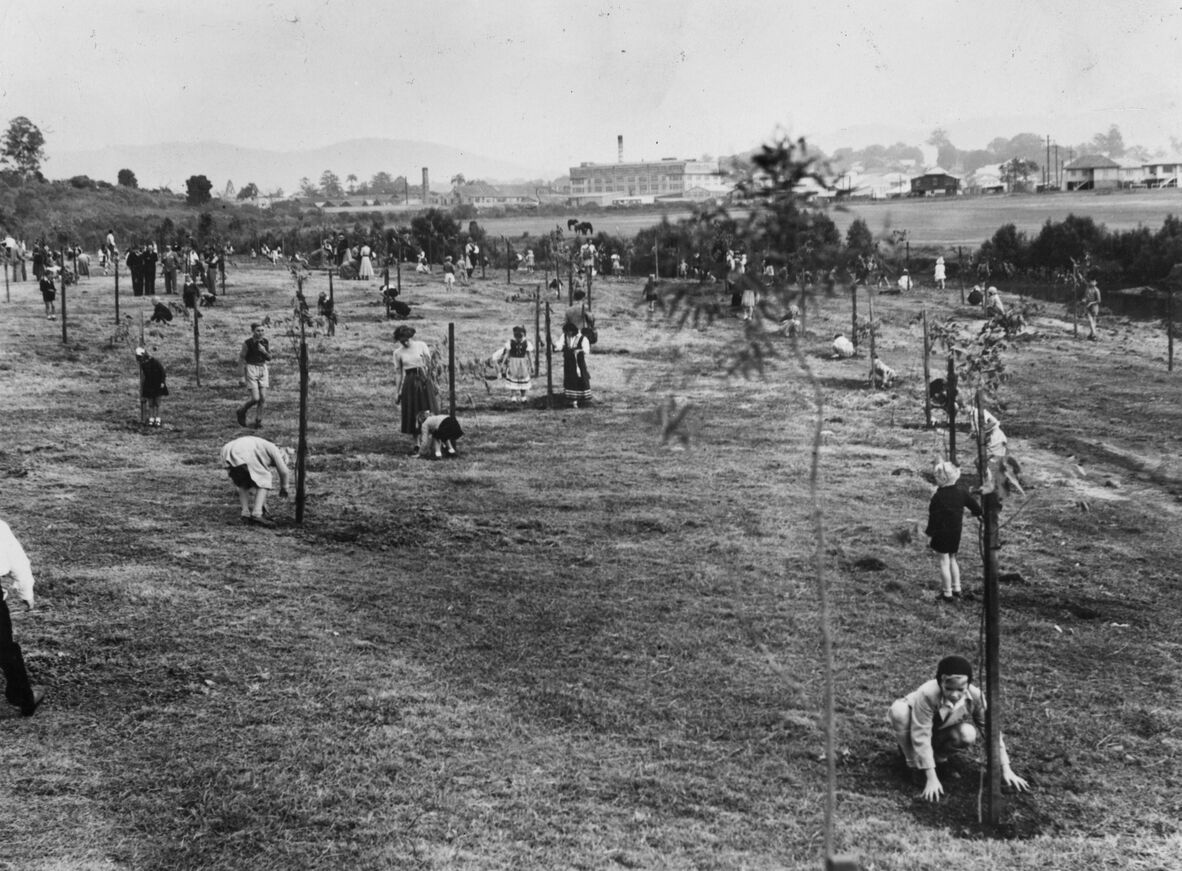
Migrant children planting trees at Ballymore Park in Herston, Queensland, 1953. 28509 Photographs of Migrant School Children, John Oxley Library, State Library of Queensland.
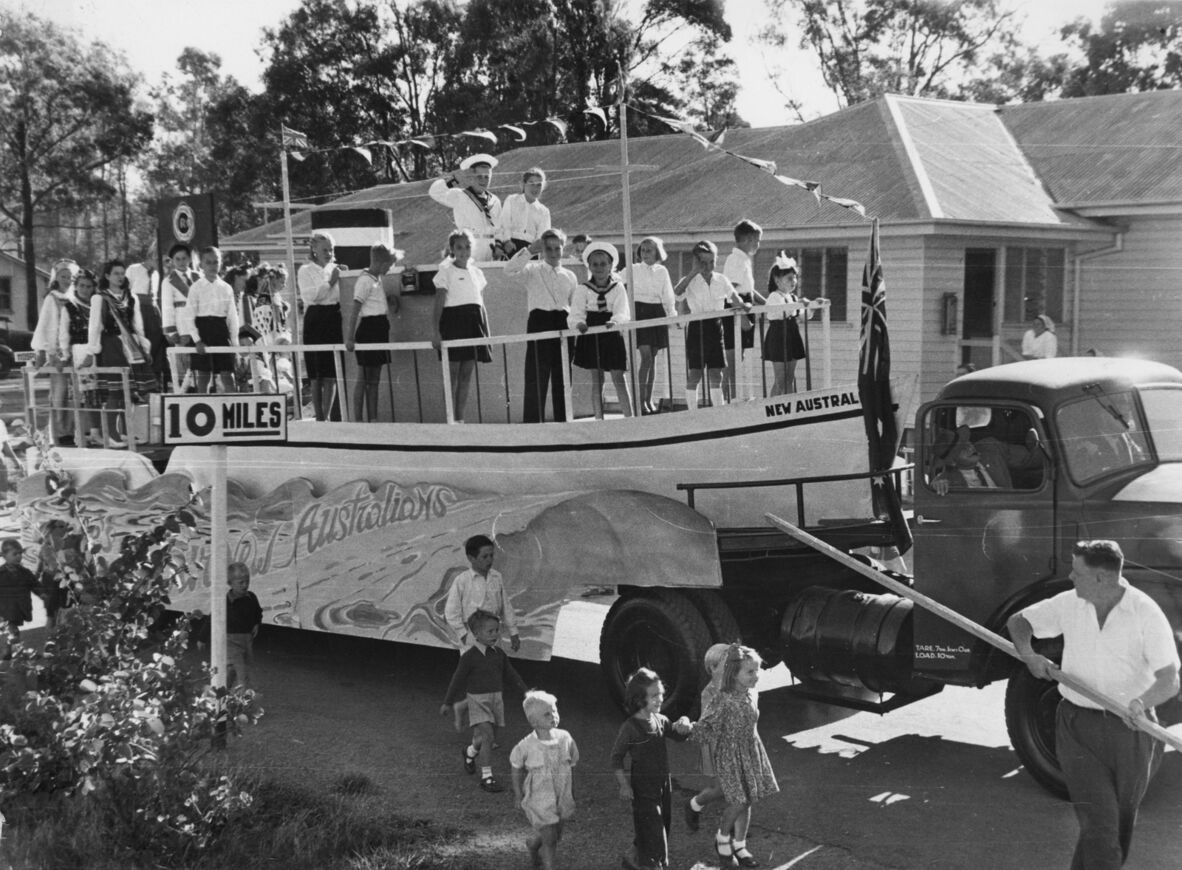
Migrant children on a 'New Australians' parade float at the Enoggera Immigration Holding Centre, Queensland, ca. 1955. 28509 Photographs of Migrant School Children, John Oxley Library, State Library of Queensland.
More recent collections continue this thread: Tradition Now, which includes The Traditional Eritrean Fasika Meal (2016) by Hannah Roche portrays an Eritrean family in Brisbane celebrating a traditional Easter feast, revealing how cultural continuity persists in new lands. Similarly, the Mu’ooz Eritrean Restaurant photographs from the Tradition Now Eritrean community photographs collection document a social enterprise founded by refugee women in West End, where food becomes a medium of empowerment, employment, and cultural transmission.
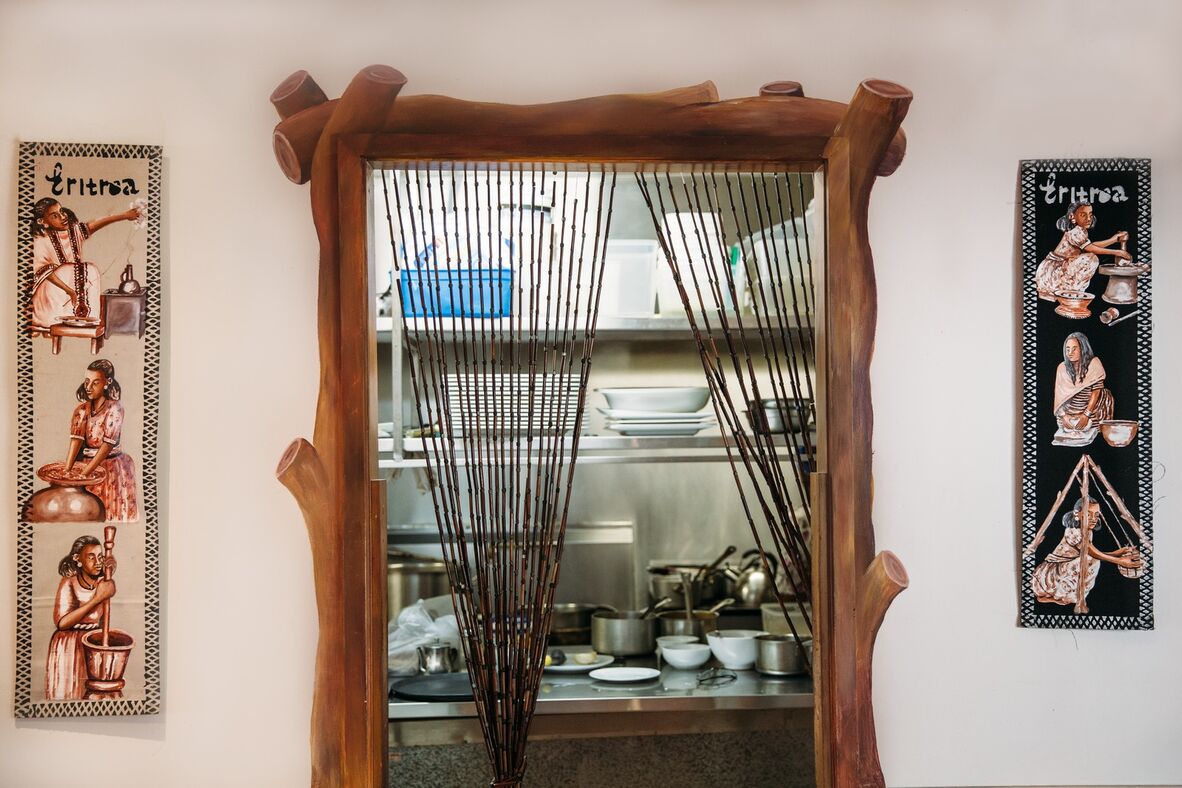
Mu'ooz Eritrean Restaurant & Catering in West End, Brisbane, May 2016. 30568, Tradition Now Eritrean community photographs, John Oxley Library, State Library of Queensland. Image number: 30568-0002-0007
Jorng Jam Cambodian-Australian oral history and exhibition collection reflects on the Cambodian-Australian experience, bringing together interviews, family photographs, and artworks to reclaim memory and identity after surviving the Khmer Rouge and refugee camps. The Rohingya United Digital Story and Oral History Interviews (2024) follow the lives of Rohingya refugees in Brisbane through their football team—founded in 2014—as a site of solidarity and community belonging. Likewise, World Refugee Day portrait photographs (2011) taken at Annerley Football Club capture the faces and diversity of refugee communities, visualising the human side of displacement. Broader multicultural narratives also emerge in Sharing Stories from Multicultural Communities: Photo essays and Oral Histories (2013–2014), a collection of oral histories and photo essays from festivals such as the Australian Italian Festival in Ingham and Africa Day in Rockhampton, showing how cultural expression is central to shaping place-based identities. Similarly, the Vietnamese Community Photographs (2005) commemorate the 30th anniversary of the Vietnamese refugees’ arrival in Queensland with images from interfaith services, formal receptions, and the inauguration of the Vietnamese Women’s Association—marking a long arc of memory and settlement.
Other equally vital collections deepen and expand this archival landscape, demonstrating the importance of uncovering and preserving refugee and migrant histories that disrupt dominant settler-colonial narratives and enrich our understanding of Queensland’s social fabric. A 1907 photograph of Spanish labourers brought to North Queensland by the Colonial Sugar Refinery Company offers a stark reminder that forced and semi-coerced migration has long underpinned the region’s economic development. These early migrant workers are rarely included in mainstream historical accounts, yet their presence is crucial to understanding how race, labour, and nationhood have been constructed in Australia.
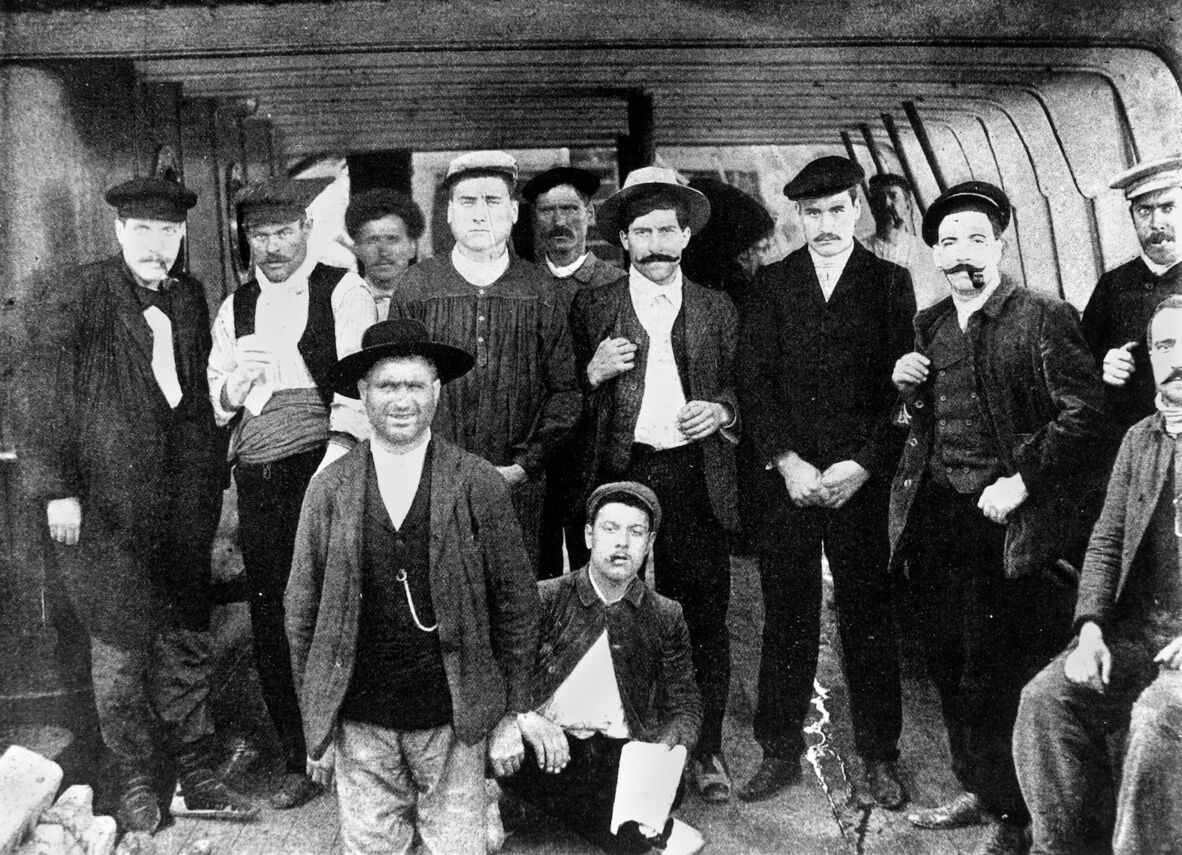
Spanish labourers imported by the Colonial Sugar Refinery Company for North Queensland plantations, 1907. Copied and digitised from an image in The Queenslander, 20 July 1907, page 22. John Oxley Library, State Library of Queensland. Neg 36734.
The Dr. Wilhelm Rechnitz Papers is another powerful example. Reverend Dr Wilhelm Rechnitz, a German-Jewish philologist and refugee, was deported to Australia aboard the HMT Dunera in 1940 and interned as an “enemy alien” despite fleeing Nazi persecution. His collection at State Library contains personal papers, photographs, linguistic research, and letters from fellow Jewish internees, many of whom were Holocaust survivors. These documents provide rare and deeply human insights into the contradictions of wartime Australia, where refugees from fascism were simultaneously seen as threats. Rechnitz’s later work in the Torres Strait, translating church texts and documenting Indigenous languages, also opens up important conversations about the entangled histories of migration, empire, and Indigenous dispossession. This collection resonates with the broader Dunera Boys archive held at the State Library of New South Wales, which was recently featured in the exhibition Dunera: Stories of Internment (2025), further affirming the national significance of such narratives. Similarly, Queensland Women and War: a multicultural perspective of the experiences of female civilians during World War II and oral histories, developed through the QANZAC100 Fellowship (2018–19) by Deborah Terranova, offers oral histories of women of Italian, Japanese, German, and refugee backgrounds who were surveilled, interned, or socially marginalised under the National Security Act during World War II. This project foregrounds how gender, migration, and war intersected to produce unique forms of vulnerability and resistance.
Other key archival materials—especially those directly related to my Fryer Library project—further demonstrate the critical need to preserve and examine refugee narratives that have long been silenced or marginalised. The Fryer Library holds four significant collections (three longstanding and one recently added) documenting the experiences of refugees detained on Nauru between 2001 and 2005, most of whom were from Afghanistan. These collections include letters, photographs, textiles, artworks, maps, and other personal artefacts that powerfully testify to the emotional, cultural, and political dimensions of detention. Among them are the artworks of Kate Durham, whose panels—each a 20 cm square—commemorate those who drowned in the SIEV X tragedy on 19 October 2001. These meticulously crafted pieces are both memorial and protest, foregrounding the human cost of Australia’s border policies. Complementary materials held at State Library expand the scope of this archive. These include documentation of Kate Durham’s exhibitions, such as her powerful exhibition message “SIEV-X ... and some were saved”, and Aashiana: Life of Refugees in Detention and Living with TPVs, a collection of art and poetry curated by the Hazara Ethnic Society in Australia. These works not only preserve memory but also mobilise it as a form of resistance against bureaucratic erasure. More recent archival acquisitions continue this trajectory. The Kangaroo Point Central Hotel & Apartments Asylum Seekers Protest Photographs (2020) record the public and detainee-led protests during the COVID-19 lockdowns, when asylum seekers—many medically evacuated from offshore detention—used balcony protests and collective mobilisation to expose ongoing injustice. Together, these collections form a vital, intergenerational record of refugee experience in Australia, challenging the structures that seek to render such histories invisible, and asserting the role of art, testimony, and protest in reclaiming both agency and public memory.
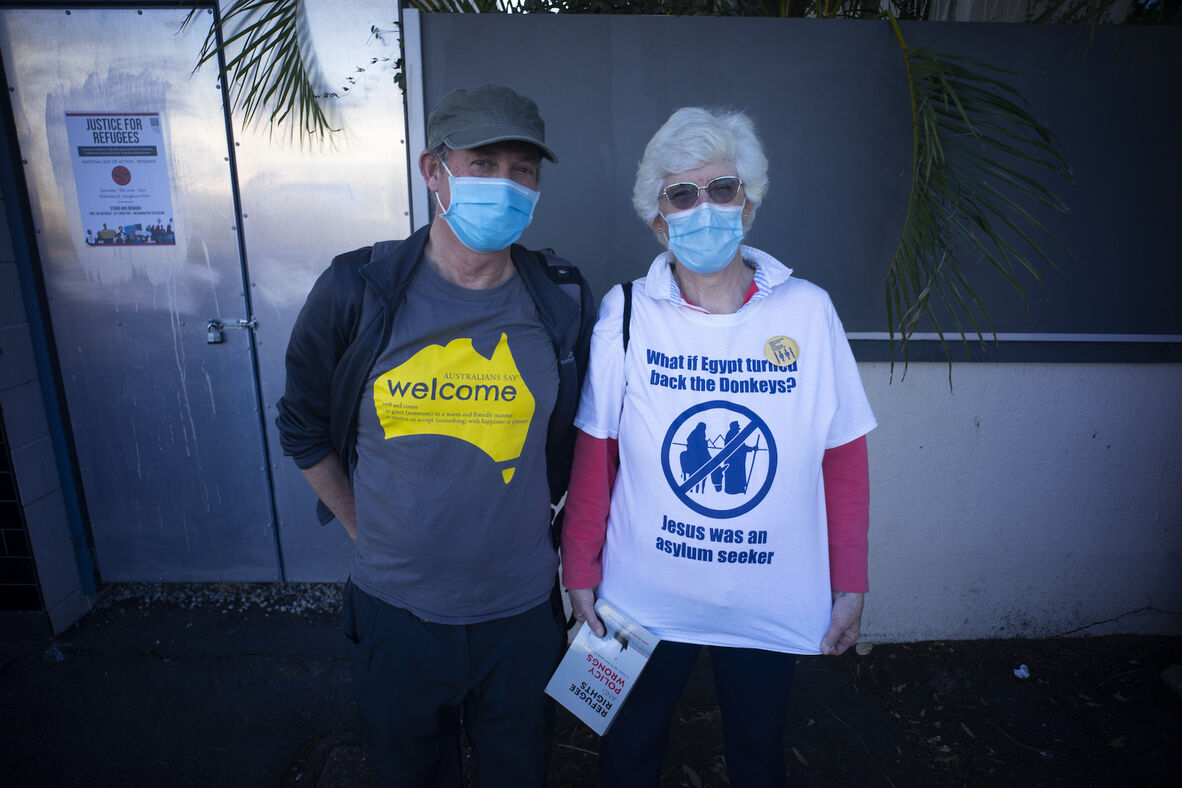
Advocates for refugee rights in front of Kangaroo Point Central Hotel & Apartments, Brisbane, 2020. Hamish Cairns, Kangaroo Point Central Hotel & Apartments asylum seekers protest photographs. John Oxley Library, State Library of Queensland. Image number: 18380432130-0003-0027.
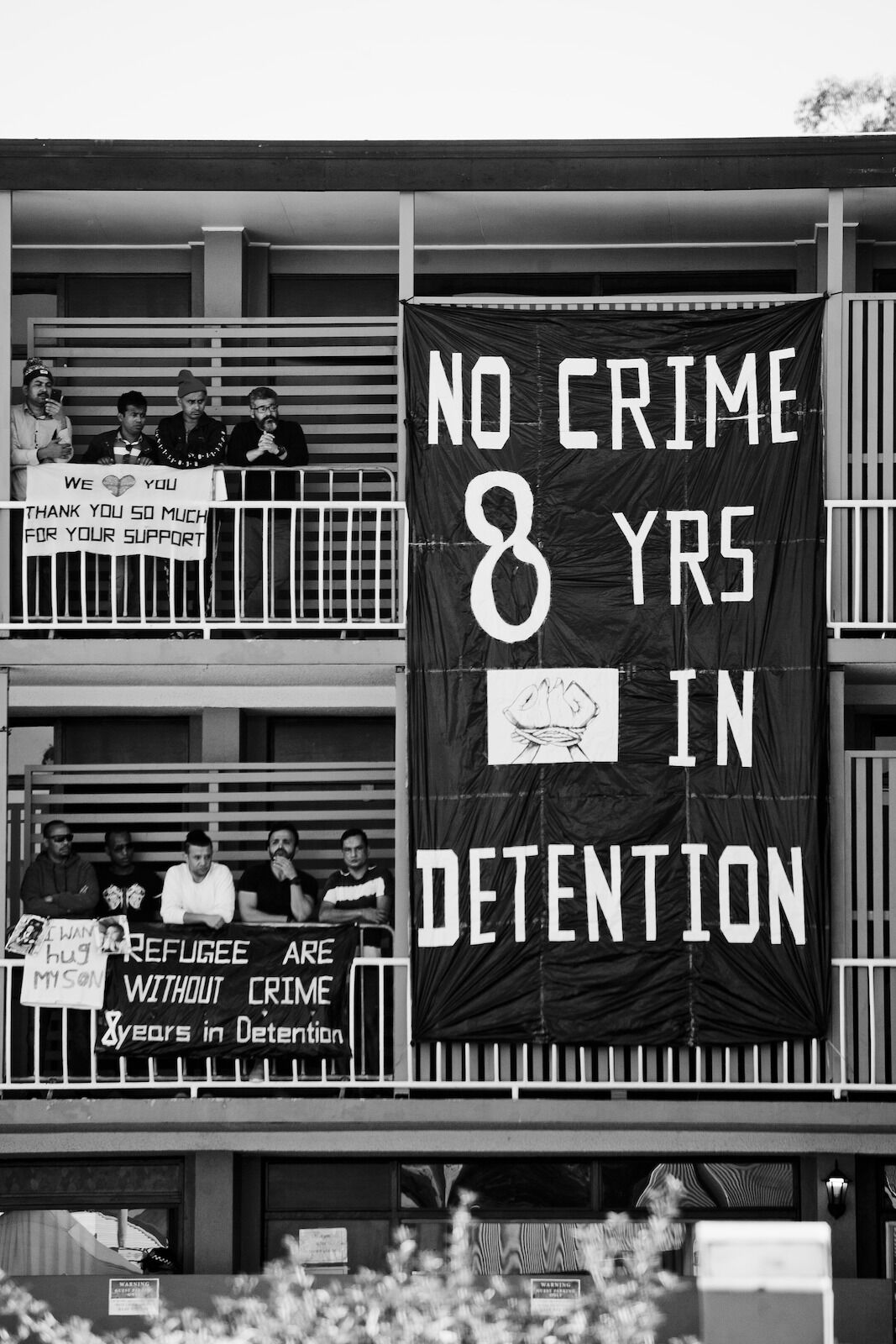
Banner on the balcony of the Kangaroo Point Central Hotel & Apartments protesting the detention of the asylum seekers detained there, Brisbane, 2020. Hamish Cairns, Kangaroo Point Central Hotel & Apartments asylum seekers protest photographs. John Oxley Library, State Library of Queensland. Image number: 18380432130-0003-0006.
In addition to existing materials, a new collection currently being processed at State Library promises to further enrich the archival record of refugee histories in Australia. Librarians at State Library have shared that they are in the process of cataloguing a collection dedicated to the Biloela family—also known as the Murugappan family—whose high-profile case mobilised nationwide support and exposed the human cost of Australia’s asylum policies. This emerging archive will document not only the lived experience of the Tamil refugee family detained for years on Christmas Island, but also the extraordinary grassroots campaign that fought for their right to return home to Biloela. The collection is said to include a wide range of materials: community letters, protest ephemera, media coverage, photographs, and other artefacts that capture the depth of public solidarity and resistance. When made accessible, this collection will serve as a powerful reminder of how storytelling, activism, and collective care can shift public narratives and influence policy. It also highlights the evolving role of cultural institutions like State Library of Queensland in preserving not just official histories, but the voices and movements that challenge the state’s treatment of refugees and asylum seekers. Their story will also be brought to the stage in Back to Bilo, a Queensland Theatre production written by Katherine Lyall-Watson and directed by Caroline Dunphy, running from 3 to 13 September 2025—an urgent and moving work based on the family’s life. Book your ticket and be part of this important conversation.
Your Story Matters — A Call to Share
My project is grounded in community collaboration. If you are a refugee living in Queensland—or if you know someone whose story should be heard—I warmly invite you to be part of this work. Every story matters. Whether it speaks of displacement and resilience, or of creativity, contribution, and everyday life, your voice is vital to building a fuller, more truthful picture of who we are. These narratives do not belong only to trauma; they also hold joy, strength, cultural knowledge, and the many ways refugee communities have shaped—and continue to shape—the social and cultural fabric of Queensland. By sharing your experience, you help transform the archive into a space of recognition, connection, and belonging.
With Respect to Country
While my project is centred on refugee stories and their contributions to Queensland’s cultural and social fabric, it is firmly grounded in an awareness of the sovereignty, resilience, and continuing leadership of Aboriginal and Torres Strait Islander peoples. Any conversation about hospitality, care, and belonging on this continent must begin with the recognition that these lands have always been, and remain, the unceded territories of First Nations peoples. Their histories of dispossession, incarceration, survival, and resistance form the foundational context in which all other migration stories unfold. It is with this awareness that I approach my work—conscious that any effort to amplify refugee voices must also honour and uphold the enduring presence and rights of the First Peoples of this land. Their stories are not separate from, but deeply entangled with, the broader narrative of movement, exclusion, and belonging in Australia.
Dr Zhila Gholami
2025 John Oxley Library Fellow
The John Oxley Library Fellowship is proudly supported by the Queensland Library Foundation's President’s Circle patrons.
Watch this video to explore Zhila’s research project, and don’t miss the full video showcasing all the 2025 Queensland Memory Awards recipients and their inspiring projects.
Comments
Your email address will not be published.
We welcome relevant, respectful comments.